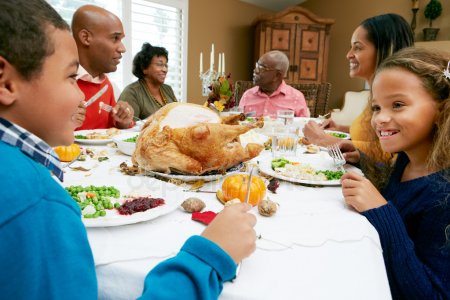This week, families and friends across the United States will gather to share a meal, to enjoy one another’s presence and to celebrate and give thanks for the blessings we corporately and individually share.
Community, the gathering together of people, will be at the center of our celebrations.
Community is broadly defined as “a group of people living in the same place or having a particular characteristic in common”. The design and make up of community is important to the functioning of society and the continuation of shared practices, traditions, and religion. Information is passed from one generation to another, from the older to the younger and vice versa, through interactions, relationships and communication.
But in modern society we find a community that is becoming increasingly more age-segregated and our opportunities to engage in these interactions, relationships, and communication are being severely hindered. According to family sociologist, Dr. Karl Pillemer, this is the first time in history that young people have little to no contact with older generations other than grandparents leading him to claim, “this is the most age-segregated society that’s ever been” (Source).
Enter Thanksgiving.
This is one of the only times in our modern society that we put a bunch of people of all ages and generations into one space and anticipate conversation with one another. And, let’s all be honest, even with family, it isn’t always easy.
Why is that?
 According to Pillemer, “People are more likely to have friends of another race than friends more or less than 10 years apart. That means that we are used to talking to be people to talk like us and do the same things as us and like the same TV shows as us and enjoy the same leisure activities as us. But believe it or not, that’s not really the best thing for us.
According to Pillemer, “People are more likely to have friends of another race than friends more or less than 10 years apart. That means that we are used to talking to be people to talk like us and do the same things as us and like the same TV shows as us and enjoy the same leisure activities as us. But believe it or not, that’s not really the best thing for us.
Studies show that when we spend time only with people our age, that leads to isolation and loneliness and greatly inhibits socialization in kids and teens and legacy-leaving in older people. The norms and practices of one generation fail to get passed to the next generation and each generation is forced to create or find their own identity, including language and customs and behaviors.
Our community is no longer communal.
But that doesn’t mean we don’t gather.
Regardless of our discomfort, most of us will make an effort this week to step outside of our comfort zones and talk with people from varying generations and life experiences. We will swap stories, laugh at how things were, laugh at how things are and, if we are intentional about, we’ll probably learn something new about us and something new about others.
The church in Western culture has not been immune to the impact of age-segregation. Age-specific ministries, curriculum, worship experiences, and facilities can create environments that make it difficult if not impossible to form intergenerational connections and nurture ongoing relationships across generations. As in the larger society, experiences of isolation, loneliness, delayed socialization, and lack of generativity occur within the church.
Our faith community is no longer communal.
But that shouldn’t mean we don’t gather.
Regardless of our discomfort, it is important for us, as a community of believers to ask some questions. Questions like “If spiritual formation is defined as “a process [and] journey through which we open our hearts to a deeper connection with God,” what is gained and lost in this process/journey by each generation when interaction and relationships with others is limited or not readily available in the church? Since Christianity is primarily perpetuated through discipleship and mentorship, how have these practices been impacted by the lack of generational integration?
What would happen if we did gather, together, and give thanks on a consistent basis?
What stories could we stop, what laughter could we enjoy, and what can we learn about ourselves and others?
This Thanksgiving, as we grab that second helping of turkey, pause for a second and look at the people who surround us and give thanks for community and for the experience of being in it, even the uncomfortable bits.
For more information about
- Kids in Worship
- Determining which Type of Family Ministry model works best for your church
- Encouraging the continued conversation through Practical Discipleship at Home
- And much more!
Check out to ReFocus Ministry or “like” our Facebook page. Join our conversation at theReFocus Family and Intergen Ministry group on Facebook.
About the author
 Refocus Ministry was started by Christina Embree, wife to Pastor Luke, mom to three wonderful kids, and church planter at Plowshares BIC. With years of experience in family ministry and children’s ministry, she is passionate about seeing churches partnering with families to encourage faith formation at home and equipping parents to disciple their kids in the faith. She recently graduated with a Masters of Arts in Ministry focusing on Family, Youth and Children’s Ministry at Wesley Seminary, she also blogs at www.refocusministry.org and is a contributing blogger at D6 Family and ChurchLeaders.com
Refocus Ministry was started by Christina Embree, wife to Pastor Luke, mom to three wonderful kids, and church planter at Plowshares BIC. With years of experience in family ministry and children’s ministry, she is passionate about seeing churches partnering with families to encourage faith formation at home and equipping parents to disciple their kids in the faith. She recently graduated with a Masters of Arts in Ministry focusing on Family, Youth and Children’s Ministry at Wesley Seminary, she also blogs at www.refocusministry.org and is a contributing blogger at D6 Family and ChurchLeaders.com


